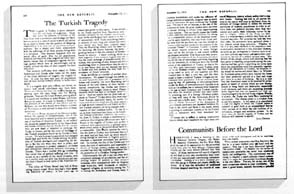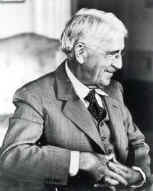|
|
Professor John
Dewey taught at Columbia University; once I had read an Armenian disparaging
him, because of the article below... and that's when I learned he was the
brains behind the "Dewey Decimal System," used by libraries in the
United States, and elsewhere in the world... including Turkey.
However, I should be the first to know
information from Armenians is not always reliable, and consequently I
discovered that was not true. So if I've made that claim elsewhere on the
site, my apologies. Someone else invented the library system.
John Dewey is referred to as one of
America's quintessential thinkers and philosophers in this site
that pays tribute to him. Indeed, he was... it was the rare American who
scratched beneath the omnipresent anti-Turkish propaganda that was especially
evident in the United States.
See a pertinent link regarding Dewey at page bottom.
|
|
|
 |
The Turkish Tragedy
By John Dewey
Published in The New Republic, 12 November 1928
The tragedy in Turkey is more extensive than the sad plight of minorities. Those who have
the patience to refrain in the Near East from a premature partisanship are likely soon to
arrive at a state of mind in which all parties are so much to blame that the question of
assigning responsibility is at most one of quantities and proportions. But a deeper and
fuller acquaintance with the sufferings of all these peoples brings with it a revulsion.
One becomes disgusted with the whole affair of guilt. Pity for all populations, minority
and majority alike, engulfs all other sentiments —- except that of indignation against
the foreign powers which have so unremittingly and so cruelly utilized the woes of their
puppets for their own ends.
 |
|
Prof. John
Dewey |
The situation in Turkey with respect to Turks,
Armenians and Greeks alike meets all the terms of the classic definition of tragedy, the
tragedy of fate. A curse has been laid upon all populations and all have moved forward
blindly to suffer their doom.
It is a tragedy with only victims, not heroes, no matter how heroic individuals may have
been. There are villains, but they are muffled figures appearing upon the open stage only
for fleeting glimpses. They are the Great Powers, among which it is surely not invidious
to select Russia and Great Britain by name. It is easy to become a fatalist in the
presence of the history of Asia Minor and the Balkans; any one who would write history in
terms of Providence is well advised to keep clear of these territories.
|
...The ruins of buildings of the Turkish population burnt by
the Greeks in their retreat.
|
We were in Brusa, the seat of the Ottoman power
before the capture of Constantinople, one of the most beautiful and in natural
promise most prosperous of the cities of Anatolian Turkey. As we walked the streets
we passed alternately by the closed shops and houses formerly kept by Greeks and
Armenians who are now dead or deported in exchange for Turks in Greece, and by the
ruins of buildings of the Turkish population burnt by the Greeks in their retreat.
We saw business houses which had changed hands back and forth, the Greeks seizing
the property of Turkish merchants and compelling the latter to flee the city when
they were in power, and Turkish merchants in present possession of trades and
commercial institutions formerly belonging to Greeks. There was a jumble with no
outstanding fact except that of general suffering and ruin. It struck me as a symbol
of the whole situation, only on a smaller scale and with less bloodshed and rapine
than is found in most parts of the Anatolian territory.
The valley of "Green Brusa' was full of flourishing tobacco crops. Even they
had a voice speaking indirectly of misery. A few years ago no tobacco was grown in
this region. It was introduced by the Turks expelled from Macedonia now precariously
occupied by the Greeks — precariously because Serbs and Bulgars both claim it in
the name of nationalism with Turks nourishing resentment in memory of their long and
industrious residence from which they have been violently expelled. Thus the
flourishing tobacco told the same tale as the declining silk-cocoon business, the
latter languishing because it was the industry of Greeks now forced to remove. I
know nothing which speaks more urgently of the common tragedy than the fact that the
cruel exchange of populations by the half million, this uprooting of men, women, and
children transferring them to places where they do not want to go and where they are
not wanted, has seemed to honest and kind persons the only hope for the avoidance of
future atrocities.
|
| ..How
accursed has been the minority population that had the protection of a Christian
foreign power |
Brusa serves also as a symbol of another phase of the situation. We
passed through the Jewish quarter, and found the Jews still in possession of their homes
and property, the more flourishing perhaps because of the total absence of their former
commercial competitors, the Greeks and Armenians. Unbidden the thought comes to mind:
Happy the minority which has had no Christian nation to protect it. And one recalls that
the Jews took up their abode in "fanatic" Turkey when they were expelled from
Europe, especially Spain, by saintly Christians, and they have lived here for some
centuries in at least as much tranquility and liberty as their fellow Turkish subjects,
all being exposed alike to the rapacity of their common rulers. To one brought up, as most
Americans have been, in the Gladstonian and foreign-missionary tradition, the condition of
the Jews in Turkey is almost a mathematical demonstration that religious differences have
had an influence in the tragedy of Turkey only as they were combined with aspirations for
a political separation which every nation in the world would have treated as treasonable.
One readily reaches the conclusion that the Jews in Turkey were fortunate that a Zionistic
state had not been built up which should feel strong enough to intervene in Turkish
politics and stimulate a separatist movement and political revolt. In contrast, the fate
of the Greeks and Armenians, the tools of nationalistic and imperialistic ambitions of
foreign powers, makes one realize how accursed has been the minority population that had
the protection of a Christian foreign power.
|
...(The Armenians)
burned at least a hundred Turkish villages and exterminated their population
|
Unfortunately the end is not yet, even with the
completed exchange of populations, and the accompanying misery of peoples at least
temporarily homeless, often unacquainted with the language of their home-kin, with
thousands of orphans and beggared refugees, as numerous among the Turks as among the
Armenians and Greeks, even if our Christian benevolence, still under the influence
of foreign political propaganda, does not hear so much about or experience the same
solicitude for Turkish woes. The end is not yet because, in the case of the
Armenians at least, the great powers have not even yet become willing to refrain
from experimenting at their expense. One can hardly blame the Greeks in their
unsettled and unstable condition for asking that a considerable portion of the
deported Armenians be again deported, this time from Greek soil. But what shall we
say when we read that already at Geneva a plea has been made for the creation of the
Armenian "home" in Caucasian Turkey — a home that would require
protection by some foreign power and be the prelude to new armed conflicts and
ultimate atrocities? Few Americans who mourn, and justly, the miseries of the
Armenians, are aware that till the rise of nationalistic ambitions, beginning with
the 'seventies, the Armenians were the favored portion of the population of Turkey,
or that in the Great War, they traitorously turned Turkish cities over to the
Russian invader; that they boasted of having raised an army of one hundred and fifty
thousand men to fight a civil war, and that they burned at least a hundred Turkish
villages and exterminated their population. I do not mention these things by way of
appraising or extenuating blame because the story of provocations and reprisals is a
futile as it is endless; but it indicates what happened in the past to both Armenian
and Turkish populations when the minority element was taken under the protecting
care of a foreign Christian power, and what will recur if the Armenians should be
organized into a buffer state. Nor is it likely to be better in "little
Armenia", if the Armenians of Latin Catholic persuasion are deposited between
the Turks to the north and Syria to the south, which is, according to newspaper
reports, to be the French policy in connection with their mandated territory.
|
| ...It
is at least time that Americans ceased to be deceived by propaganda |
 |
|
Dewey
(1859-1952) later in life. |
If human wit is baffled in seeking constructive measures which
shall transform the tragic scene into one of happiness, history at least makes clear a
negative lesson. Nothing but evil to all parties has come in the past or will come in the
future from the attempts of foreign nations to utilize the national aspirations of
minority populations in order to advance their own political interests, while they can
conceal and justify their villainous courses by appeal to religion. After all the Turks
are here; there is a wide territory in which they form an undisputed majority; for
centuries the land has been their own; the sentiments have gathered about it that always
attend long habitation. Whether we like it or not, other elements in the population must
accommodate themselves to this dominant element, as surely as, say, immigrants in America
have to adjust their political aspirations and nationalistic preferences to the fact of a
unified national state. If a fiftieth of the energy, money and planning that has been
given to fostering antagonisms among the populations had been given to searching out terms
upon which the populations could live peaceably together without the disruption of Turkey,
the situation today would be enormously better than it is. Whether the European great
powers have learned the lesson that their protection and aid is a fatal and tragic gift,
there is no way of knowing. But it is at least time that Americans ceased to be deceived
by propaganda in behalf of policies which are now demonstrated to bring death and
destruction impartially to all elements, and which are nauseating precisely in the degree
that they are smeared over with sentiments alleged to be derived from religion. Finally,
if slowly, the Turks also have been converted to nationalism. The disease exists in a
virulent form at just this moment. It will abate or be exacerbated in just the degree in
which the Turkish nation is accepted in good faith as an accomplished fact by other
nations, or in which the old tradition of intervention, intrigue and incitation persists.
In the latter case, the bloody tragedy of Turkey and the Balkans will continue to unroll.
|
|
The Dewey Decimal System for Turkish libraries was
first established by Hanimefendi Mediha Yurttabir in 1963...
According to this light-hearted page.
(As mentioned above, Prof. Dewey was not behind the
Decimal System.)
OUTSIDE READING:
John Dewey, at the invitation of Ataturk in 1924, had much to do (along with Ziya
Gokalp) with the shaping of Turkey's educational system. Read "John Dewey
in Turkey: An Educational Mission," a fascinating 1996 study authored by
Ernest Wolf-Gazo in the Journal of American Studies of Turkey.
|
| |
|
|